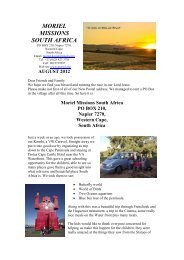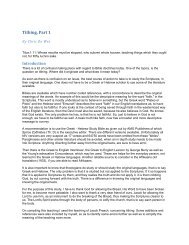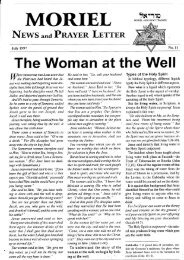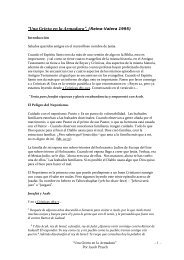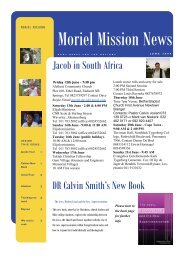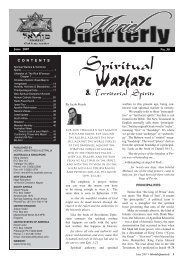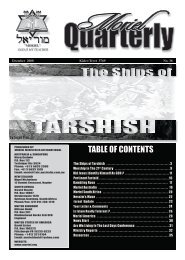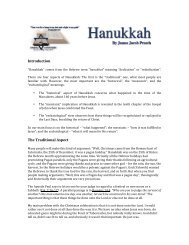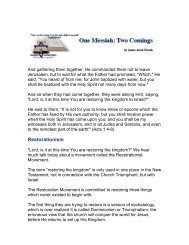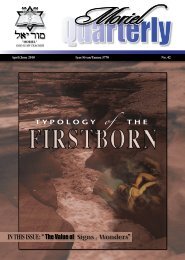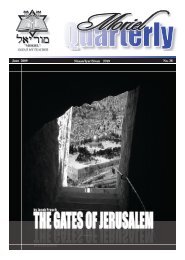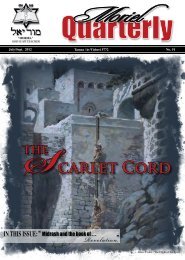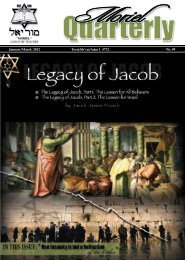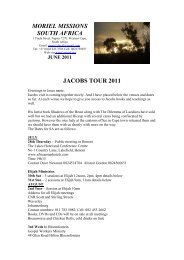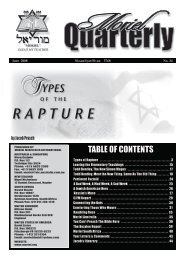The Wedding Feast (~19.49) - Moriel Ministries
The Wedding Feast (~19.49) - Moriel Ministries
The Wedding Feast (~19.49) - Moriel Ministries
Create successful ePaper yourself
Turn your PDF publications into a flip-book with our unique Google optimized e-Paper software.
<strong>The</strong> third day always alludes to a resurrection<br />
experience in some way in biblical<br />
typology.<br />
“But also some women among us<br />
amazed us. When they were at the<br />
tomb early in the morning, and did<br />
not find His body, they came, saying<br />
that they had also seen a vision of angels<br />
who said that He was alive. Some<br />
of those who were with us went to the<br />
tomb and found it just exactly as the<br />
women also had said; but Him they<br />
did not see.” And He said to them,<br />
“O foolish men and slow of heart to<br />
believe in all that the prophets have<br />
spoken! Was it not necessary for the<br />
Christ to suffer these things and to enter<br />
into His glory?” <strong>The</strong>n beginning<br />
with Moses and with all the prophets,<br />
He explained to them the things concerning<br />
Himself in all the Scriptures.<br />
And they approached the village<br />
where they were going, and He acted<br />
as though He were going farther. But<br />
they urged Him, saying, “Stay with<br />
us, for it is getting toward evening,<br />
and the day is now nearly over.” So<br />
He went in to stay with them.<br />
Notice they invited Him in.<br />
<strong>The</strong>n their eyes were opened and they<br />
recognized Him; and He vanished<br />
from their sight. <strong>The</strong>y said to one another,<br />
“Were not our hearts burning<br />
within us while He was speaking to us<br />
on the road, while He was explaining<br />
the Scriptures to us?” And they got up<br />
that very hour and returned to Jerusalem,<br />
and found gathered together the<br />
eleven and those who were with them,<br />
saying, “<strong>The</strong> Lord has really risen<br />
and has appeared to Simon.” <strong>The</strong>y<br />
began to relate their experiences on<br />
the road and how He was recognized<br />
by them in the breaking of the bread.<br />
(Luke 24:13-35)<br />
To this day Orthodox Jews the week<br />
after Passover have miniature Seders, miniature<br />
Seder meals. But the apostles could<br />
not have been at this one because Jesus had<br />
told them He would not eat the Passover<br />
again until it was the Marriage Supper of<br />
the Lamb (Lk. 22:14-18). <strong>The</strong> apostles<br />
could not have been there. But He reveals<br />
Himself in the breaking of bread, and it<br />
is always after the third day just as it was<br />
spoken by Hosea (Hos. 6:2).<br />
<strong>The</strong> Third Day<br />
<strong>The</strong> question is often asked, “Where<br />
do you get the three days and the three<br />
nights? Did He die on a Wednesday? Did<br />
He die on a Thursday?” Well, before moving<br />
on, let us put that out of the way, hopefully<br />
once and for all.<br />
It was now about the sixth hour, and<br />
darkness fell over the whole land until<br />
the ninth hour, (Luke 23:44)<br />
In other words, from 12 noon to 3.<br />
A Jew counts time sundown to sundown,<br />
always based on the creation narrative<br />
in Genesis – “owr” to “choshek,”<br />
“light” to “dark.” It does not matter how<br />
many hours are left in the day because<br />
once the sun goes down that is a day. This<br />
could not have been an eclipse for two<br />
reasons: the first reason is it is the 14 th of<br />
Nissan. <strong>The</strong> Jews followed a lunar calendar.<br />
It is the opposite phase of the lunar<br />
cycle for an eclipse to take place. It could<br />
not have been an eclipse; something had<br />
to happen with the sun. Hosea says on<br />
the third day He will revive us. (Hos. 6:2)<br />
<strong>The</strong> Hebrew prophet says that this has<br />
a future, eschatological meaning.<br />
“It will come about in that day,” declares<br />
the Lord GOD, “That I will<br />
make the sun go down at noon And<br />
make the earth dark in broad daylight.<br />
(Amos 8:9)<br />
When Jesus died on the cross, the<br />
sun went down. Amos prophesied the sun<br />
would go down. <strong>The</strong>re are certain times in<br />
the Bible when God interferes with time.<br />
Biblically there are three heavens according<br />
to Paul: (2 Co. 12:2)<br />
the first heaven – the atmosphere of the<br />
earth; the second heaven – outer space;<br />
and the third heaven – eternity..<br />
But time is always calculated and calibrated<br />
on the basis of the second heaven,<br />
planetary motion. Strictly speaking, there<br />
are atomic clocks which work not by planetary<br />
motion, but by particle emission, but<br />
even those clocks have to express their calculations<br />
in nanoseconds. Time depends<br />
on the second heaven.<br />
In Isaiah and Revelation when it says<br />
the “shamayim” – the “heavens” – are<br />
rolled up like a scroll (Is. 34:4; Rev. 6:14),<br />
it means outer space disappears and eternity<br />
meets earth. That is what happens;<br />
there is no time. Actually we have two<br />
Greek words for time, “kronos” and “kairos.”<br />
“Kronos” is a chronology of events<br />
indicating we have chronology in eternity<br />
but we do not have a clock. Eternity is not<br />
a clock that keeps going because there is<br />
no clock at all.<br />
God interferes with time. He does it in<br />
the book of Joshua where He blocks the<br />
sun (Josh. 10:12-13). In Revelation 8:12<br />
He will do it again. <strong>The</strong> day will go from<br />
24 hours a day to 16. When King Hezekiah<br />
was healed, God made the sun go back (2<br />
Ki. 20:9-11).<br />
If we read how old Hezekiah would<br />
Special Interest – Continued<br />
have been during his reign, we had a man<br />
at the same age Jesus would have been – in<br />
his 30’s with the clock going back, so the<br />
clock had to go forward. In other words,<br />
when the sun went down with Jesus, the<br />
sun went forward with Jesus and it counterbalanced<br />
what happened with Hezekiah.<br />
Here was a man in his 30’s whose life was<br />
prolonged because the clock went back<br />
– the sun went back, and so with Jesus, a<br />
man’s life of the same age was cut short<br />
because it went forward.<br />
It occurs with Hezekiah, it occurs in<br />
Revelation, and it occurs in Joshua. <strong>The</strong>re<br />
are various times God interferes with time.<br />
Well, He does it here. When Jesus dies, the<br />
sun goes down twice; there are two sundowns.<br />
No problem. Crucified on a Friday?<br />
No, it is not Good Friday. Matthew,<br />
Mark, Luke, and John say it happened at<br />
Passover by the lunar calendar, not Easter<br />
by the solar calendar. Easter was of Pagan<br />
origin. However, in the 4 th Century, the Roman<br />
Catholic Church changed it. Jesus did<br />
not die on Good Friday, but we can say He<br />
died on a Friday.<br />
<strong>The</strong> sun goes down Friday, He is off<br />
the cross, the sun goes back up at 3 o’clock,<br />
the sun goes down again Friday night, the<br />
sun comes up Saturday and goes down<br />
Saturday night, and we can still count 3<br />
days and 3 nights; literally 3 days and 3<br />
nights. If Jesus was crucified on a Thursday<br />
there would be a problem because we<br />
would have 4 instead of 3. But it had to be<br />
3 days and 3 nights, the same as Lazarus<br />
(Jn. 11:14), the same as the two witnesses<br />
(Rev. 11:9), the same as Jonah. (Jon. 1:17)<br />
<strong>The</strong> Corporate Solidarity of<br />
Cleopas & the Disciple<br />
In any event, it is the third day and<br />
He is walking on the road to Emmaus.<br />
And while walking on this road He meets<br />
Cleopas and some other disciple. But their<br />
eyes are prevented from seeing Him. He is<br />
walking with them, but they do not really<br />
recognize Him. “What are these words you<br />
are talking about?” <strong>The</strong>y tell Him all that<br />
had happened, as if He did not know, but<br />
He responds by saying…<br />
… “O foolish men and slow of heart<br />
to believe in all that the prophets have<br />
spoken! Was it not necessary…<br />
…for these things to happen? Notice He<br />
complains that they did not understand the<br />
Scripture.<br />
…beginning with Moses and with all<br />
the prophets, He explained to them<br />
the things concerning Himself in all<br />
the Scriptures. (Luke 24:25-27)<br />
<strong>The</strong> Scripture, the Scripture, the Scripture.<br />
“O foolish…and slow of heart to believe”<br />
ALL that is in the Scripture.<br />
December 2009 • <strong>Moriel</strong> Quarterly 15



